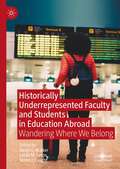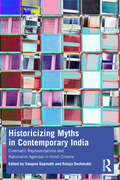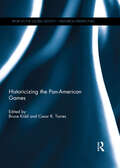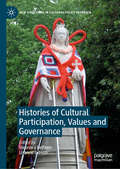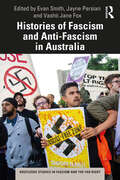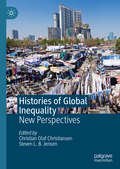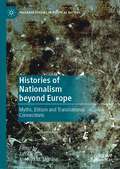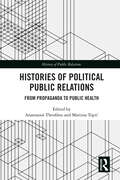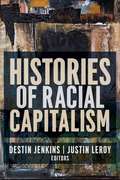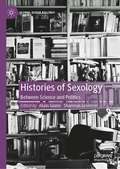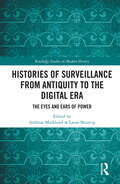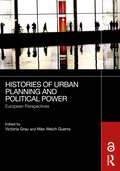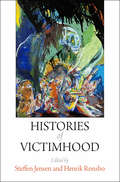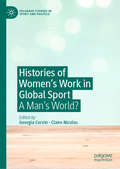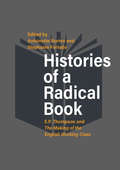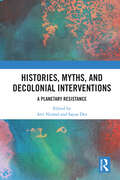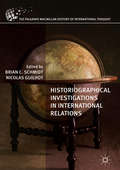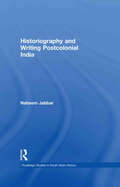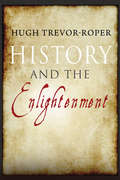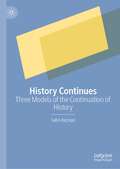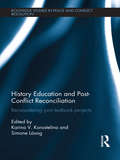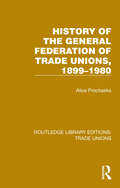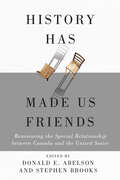- Table View
- List View
Historical and Multicultural Encyclopedia of Women's Reproductive Rights in the United States
by Judith A. BaerMany brief articles about womens reproductive rights in the U.S.
Historically Underrepresented Faculty and Students in Education Abroad: Wandering Where We Belong
by Devin L. Walker Linda M. Lyons Seneca VaughtThis book examines how the unique perspectives of BIPOC faculty and students must be integrated into the undergraduate curriculum to expose students of color to education abroad experiences, enhance cultural awareness and sensitivity, and lend to a broader diversity and inclusion perspective. This edited volume, written by authors of color, argues that education abroad programs not only provide essential academic and cultural enrichment but can also be an important nexus of innovation. When approached within a creative, interdisciplinary, and holistic framework, these programs are ripe with opportunities to engage various constituencies and a potent source of strategies for bolstering diversity, recruitment, retention, and graduation. Despite a tendency to view study abroad as a luxurious option for persons with wealth and means, the editors and their authors argue that global education should be thought of as a fundamental and integral part of higher education, for all students, in a global era.
Historicism and Fascism in Modern Italy
by David D. RobertsDuring the early decades of the twentieth century, Italy produced distinctive innovations in both the intellectual and political realms. On the one hand, Benedetto Croce (1866-1952) and Giovanni Gentile (1875-1944) spearheaded a radical rethinking of historicism and philosophical idealism that significantly reoriented Italian culture. On the other hand, the period witnessed the first rumblings of fascism. Assuming opposite sides, Gentile became the semi-official philosopher of fascism while Croce argued for a renewed liberalism based on 'absolute' historicism.In Historicism and Fascism in Modern Italy, David D. Roberts uses the ideological conflict between Croce and Gentile as a basis for a wider discussion of the interplay between politics and ideas in Italy during the early-twentieth century. Roberts examines the connection between fascism and the modern Italian intellectual tradition, arguing that the relationship not only deepens our understanding of fascism and liberalism but also illuminates ongoing dangers and possibilities in the wider Western world. This set of twelve essays by one of the leading scholars in the field represents an authoritative view of the modern Italian intellectual tradition, its relationship with fascism, and its enduring implications for history, politics, and culture in Italy and beyond.
Historicizing Myths in Contemporary India: Cinematic Representations and Nationalist Agendas in Hindi Cinema
by Swapna Gopinath Rutuja DeshmukhThis book examines cinematic practices in Bollywood as narratives that assist in shaping the imagination of the age, especially in contemporary India. It examines historical films released in India since the new millennium and analyses cinema as a reflection of the changing socio-political and economic conditions at any given period. The chapters in Historicizing Myths in Contemporary India: Cinematic Representations and Nationalist Agendas in Hindi Cinemas also illuminate different perspectives on how cinematic historical representations follow political patterns and market compulsions, giving precedence to a certain past over the other, creating a narrative suited for the dominant narrative of the present. From Mughal-e-Azam to Padmaavat, and Bajirao Mastani to Raazi, the chapters show how creating history out of myths validate hegemonic identities in a rapidly evolving Indian society. The volume will be of interest to scholars of film and media studies, literature and culture studies, and South Asian studies.
Historicizing the Pan-American Games (Sport in the Global Society - Historical Perspectives)
by Bruce Kidd and Cesar R. TorresThe Pan-American Games, begun officially in 1951 in Buenos Aires and held in every region of the western hemisphere, have become one of the largest multi-sport games in the world. 6,132 athletes from 41 countries competed in 48 sports in the 2015 Games in Toronto, Canada. The Games are simultaneously an avenue for the spread of the Olympic Movement across the Americas, a stage for competing ideologies of Pan-American unity, and an occasion for host city infrastructural stimulus and economic development. And yet until this volume, the Games have never been studied as a single entity from a scholarly viewpoint. Historicizing the Pan-American Games presents 12 original articles on the Games. Topics range from the origins of the Games in the period between the world wars, to their urban, hemispheric and cultural legacies, to the policy implications of specific Games for international sport. The entire collection is set against the shifting economic, social, political, cultural, sporting and artistic contexts of the turbulent western hemisphere. Historicizing the Pan-American Games makes a significant contribution to the literature on major games, Olympic sport and sport in the western hemisphere. This book was previously published as a special issue of The International Journal of the History of Sport.
Histories of Cultural Participation, Values and Governance (New Directions in Cultural Policy Research)
by Eleonora Belfiore Lisanne GibsonThis book develops the first integrated, critical-historical examination of the terms, narratives and assumptions constructing present day notions of participation and value, and the relations between them. Histories of Cultural Participation, Values and Governance proposes a radical re-evaluation of these relationships, organized in two inter-related sections, on political discourses of participation and value, and on culture and governance. The essays collected here provide an in-depth historical understanding of the development of definitions, assumptions and beliefs around the nature and value of cultural participation, their place in contemporary cultural governance and exploitation in local socio-economic development strategies. They also bring a novel perspective to current policy, practice and scholarly debates on the connections between culture, place-making and the creative economy. As such, the essays provide vital historical insight that sheds light on contemporary issues of cultural participation, value and governance.
Histories of Fascism and Anti-Fascism in Australia (Routledge Studies in Fascism and the Far Right)
by Evan Smith Jayne Persian Vashti Jane FoxHistories of Fascism and Anti-Fascism in Australia provides a history of fascist movements and anti-fascist resistance in Australia over the past century.In recent years, the far right has become a resurgent force across the globe, resulting in populist parties securing electoral victories, social movements organising on the streets, and acts of right-wing terrorism. Australia has not been immune to this. However, this is not merely a recent phenomenon; it has a long history of fascist and far-right groups and individuals. These groups have attempted to situate themselves within the wider settler colonial political landscape, often portraying themselves as the inheritors of a violent and exclusionary colonial past. Concurrently, these groups have linked into globalised anti-communist and white supremacist networks. At the same time, Australia has often seen resistance to fascism and the far right, from the political centre to the far left. Covering the period from the 1920s to the present day, and featuring insights from historians, sociologists, and political scientists, this book provides the most detailed account of this fascinating and important topic. This book will be of interest to students and activists with an interest in the extreme right and anti-fascism as well as Australian history, politics, and society.
Histories of Global Inequality: New Perspectives
by Christian Olaf Christiansen Steven L. B. JensenThis book argues that inequality is not just about numbers, but is also about lived, historical experience. It supplements economic research and offers a comprehensive stocktaking of existing thinking on global inequality and its historical development. The book is interdisciplinary, drawing upon regional and national perspectives from around the world while seeking to capture the multidimensionality and multi-causality of global inequalities. Grappling with what economics offers – as well as its blind spots – the study focuses on some of today’s most relevant and pressing themes: discrimination and human rights, defences and critiques of inequality in history, decolonization, international organizations, gender theory, the history of quantification of inequality and the history of economic thought. The historical case studies featured respond to the need for wider historical research and to calls to examine global inequality in a more holistic manner.The Introduction 'Chapter 1 Histories of Global Inequality: Introduction' is open access under a CC BY 4.0 license via link.springer.com.
Histories of Nationalism beyond Europe: Myths, Elitism and Transnational Connections (Palgrave Studies in Political History)
by Jan Záhořík Antonio M. MoroneThis edited collection explores varying shapes of nationalism in different regional and historical settings in order to analyse the important role that nationalism has played in shaping the contemporary world. Taking a global approach, the collection includes case studies from the Middle East, Africa, Asia and North America. Unique not only in its wide range of geographically diverse case studies, this book is also innovative due to its comparative approach that combines different perspectives on how nations have been understood and how they came into being, highlighting the transnational connections between various countries. The authors examine what is meant by the concepts of ‘nation’ and ‘national identity,’ discussing themes such as citizenship, ethnicity, historical symbols and the role of elites. By exploring these entangled categories of nationalism, the authors argue that throughout history, elites have created ‘artificial ’ versions of nationalism through symbolism and mythology, which has led to nationalism being understood through social constructivist or primordialist lenses. This diverse collection will appeal to researchers studying nationalism, including historians, political scientists and anthropologists.
Histories of Political Public Relations: From Propaganda to Public Health (The History of Public Relations)
by Anastasios Theofilou Martina TopićDespite strong arguments that have been exploring the influence of Public Relations (PR) on public information, propaganda, the development of nation branding and policy-making, there remains little research on the history of governmental PR. This has led to a limited understanding of the discipline that aligns it with a supportive role to wider marketing campaigns or with a stretch to political communication through lobbying.Responding to this challenge, this book explores PR’s historical connection to government communication. The editors assemble respected contributors to explore government PR through a series of micro-histories and also examine larger theoretical issues, including the relationship between PR and propaganda. The chapters explore behavioural aspects of government campaigning and the tools and techniques typically used. In the context of COVID-19 and global resistance to measures, while health and climate scientists warn that there might be more pandemics to come, looking at behavioural campaigning becomes even more relevant.This book will add knowledge and understanding to the fields of PR history and historiography. Academics and researchers will find the volume appropriate for research and teaching.
Histories of Racial Capitalism (Columbia Studies in the History of U.S. Capitalism)
by Jenkins, Destin; Leroy, JustinThe relationship between race and capitalism is one of the most enduring and controversial historical debates. The concept of racial capitalism offers a way out of this impasse. Racial capitalism is not simply a permutation, phase, or stage in the larger history of capitalism—since the beginning of the Atlantic slave trade and the colonization of the Americas, capitalism, in both material and ideological senses, has been racial, deriving social and economic value from racial classification and stratification. Although Cedric J. Robinson popularized the term, racial capitalism has remained undertheorized for nearly four decades.Histories of Racial Capitalism brings together for the first time distinguished and rising scholars to consider the utility of the concept across historical settings. These scholars offer dynamic accounts of the relationship between social relations of exploitation and the racial terms through which they were organized, justified, and contested. Deploying an eclectic array of methods, their works range from indigenous mortgage foreclosures to the legacies of Atlantic-world maroons, from imperial expansion in the continental United States and beyond to the racial politics of municipal debt in the New South, from the ethical complexities of Latinx banking to the postcolonial dilemmas of extraction in the Caribbean. Throughout, the contributors consider and challenge how some claims about the history and nature of capitalism are universalized while others remain marginalized. By theorizing and testing the concept of racial capitalism in different historical circumstances, this book shows its analytical and political power for today’s scholars and activists.
Histories of Sexology: Between Science and Politics (Global Queer Politics)
by Alain Giami Sharman LevinsonHistories of Sexology: Between Science and Politics takes an interdisciplinary and reflexive approach to the historiography of sexology. Drawing on an intellectual history perspective informed by recent developments in science and technology studies and political history of science, this book examines specific social, cultural, intellectual, scientific and political contexts that have given shape to theories of sexuality, but also to practices in medicine, psychology, education and sexology. Furthermore, it explores various ways that theories of sexuality have both informed and been produced by sexologies—as scientific and clinical discourses about sex—in Western countries since the 19th century.
Histories of Surveillance from Antiquity to the Digital Era: The Eyes and Ears of Power (Routledge Studies in Modern History)
by Andreas Marklund; Laura SkouvigDeploying empirical studies spanning from early Imperial China to the present day, 17 scholars from across the globe explore the history of surveillance with special attention to the mechanisms of power that impel the concept of surveillance in society. By delving into a broad range of historical periods and contexts, the book sheds new light on surveillance as a societal phenomenon, offering 10 in-depth, applied analyses that revolve around two main questions: • Who are the central actors in the history of surveillance? • What kinds of phenomena have been deemed eligible for surveillance, for example, information flows, political movements, border-crossing trade, interacting with foreign states, workplace relations, gender relations, andsexuality?
Histories of Urban Planning and Political Power: European Perspectives
by Victoria GrauUrban planning has always been a preeminent instrument of political power. In this volume, contributions from Europe and Latin America provide insight into the functions of planning under very different political and societal constellations over the last hundred years: dictatorships, parliamentary democracies, and illiberalism; capitalism and state socialism; state interventionism and neoliberalism; societies in times of peace and societies marked by colonial, civil, world, or cold wars.The dictatorships of the 1920s and 1930s made extensive use of the potential of planning for economic growth, for brutal repression, but also for the integration of certain population groups and as an effective means of propaganda. The legacy of these dictatorships still characterizes many European cities today and confronts planning with complex tasks. Dictatorial state socialism planned to establish a new social order with a particular technocratic rationality, which did not, however, cancel completely the tendential autonomy of the professional planning sphere. Parliamentary democracies and illiberal regimes have developed specific new practices of using planning to rebuild cities in the interests of neoliberal economic growth and populistic legitimization of power.Histories of Urban Planning and Political Power takes the next steps in significantly expanding our understanding of planning and politics. The book will be of interest to students and scholars of urbanism, urban/town planning, spatial planning, spatial politics, urban development, urban policies, and planning history and European history of the 20th century.The Open Access version of this book, available at http://www.taylorfrancis.com, has been made available under a Creative Commons Attribution-Non Commercial-No Derivatives (CC-BY-NC-ND) 4.0 license.
Histories of Victimhood (The Ethnography of Political Violence)
by Steffen Jensen Henrik RonsboThe word and concept of victim bear a heavy weight. To represent oneself or to be represented as a victim is often a first and vital step toward having one's suffering and one's claims to rights socially and legally recognized. Yet to name oneself or be called a victim is a risky claim, and social scientists must struggle to avoid erasing either survivors' experience of suffering or their agency and resourcefulness. Histories of Victimhood engages with this dilemma, asking how one may recognize and acknowledge suffering without essentializing affected communities and individuals.This volume tackles the theoretical and empirical questions surrounding the ways victims and victimhood are constructed, represented, and managed by state and nonstate actors. Geographically broad, the twelve essays in this volume trace histories of victimhood in Colombia, India, South Africa, Guatemala, Angola, Sierra Leone, Turkey, Occupied Palestine, Denmark, and Britain. They examine the implications of victimhood in a wide range of contexts, including violent occupations, displacement, war, reparation projects, refugee assistance, HIV treatment, trauma intervention, social welfare projects, and state formation. In exploring varying forms of hardship and identifying what people do to survive, how they make sense of their own suffering, and how they are frequently either acted upon or ignored by humanitarian agencies and states, Histories of Victimhood encourages us to see victimhood not as a definite and definable category of experience but as a changeable and culturally contingent state.Contributors: Sofie Danneskiold-Samsøe, Pamila Gupta, Ravinder Kaur, Stine Finne Jakobsen, Andrew M. Jefferson, Steffen Jensen, Tobias Kelly, Frédéric Le Marcis, Walter Paniagua, Elizabeth A. Povinelli, Darius Rejali, Henrik Ronsbo, Lotte Buch Segal, Nerina Weiss.
Histories of Women's Work in Global Sport: A Man’s World? (Palgrave Studies in Sport and Politics)
by Georgia Cervin Claire NicolasSport has never been a man’s world. As this volume shows, women have served key roles not only as athletes and spectators, but as administrators, workers, decision-makers, and leaders in sporting organizations around the world. Contributors excavate scarce archival material to uncover histories of women’s work in sport, from swimming teachers in nineteenth-century England to national sports administrators in twentieth-century Côte d’Ivoire, and many places in between. Their work has been varied, holding roles as teachers, wives, and secretaries in sporting contexts around the world, often with diplomatic functions—including at the 1968 and 1992 Olympic Games. Finally, this collection shows how gender initiatives have developed in sporting institutions in Europe and international sport federations today. With a foreword by Grégory Quin and afterword by Anaïs Bohuon, this is a pioneering study into gender and women’s work in global sport.
Histories of a Radical Book: E. P. Thompson and <em>The Making of the English Working Class</em>
by Antoinette Burton and Stephanie FortadoFor better or worse, E.P. Thompson’s monumental book The Making of the English Working Class has played an essential role in shaping the intellectual lives of generations of readers since its original publication in 1963. This collected volume explores the complex impact of Thompson’s book, both as an intellectual project and material object, relating it to the social and cultural history of the book form itself—an enduring artifact of English history.
Histories, Myths and Decolonial Interventions: A Planetary Resistance
by Arti Nirmal Sayan DeyThis book explores postcolonial myths and histories within colonially structured narratives which persist and are carried in culture, language and history in various parts of the world. It analyses constructions of identities, stereotypes and mythical fantasies in post-colonial society. Exploring a wide range of themes including the appropriation and use of language, myths of decolonialization and nationalism and the colonial influence on systems of academic knowledge, the book focuses on how these myths reinforce, subvert and appropriate colonial binaries for the articulation of the post-colonial self. With essays which study narratives of emigrants in Argentina, the colonial mythology in the Dodecanese in Italy, and the mythico-narratives of island insularity in contemporary Sri Lanka among others, this volume emphasizes the role of indigenous studies in building a postcolonial consciousness. This book will be of interest to scholars and researchers of post-colonial studies, cultural studies, literature, history, political science and sociology.
Historiographical Investigations in International Relations (The Palgrave Macmillan History of International Thought)
by Nicolas Guilhot Brian C. SchmidtThis book critically investigates the historiography of International Relations. For the past fifteen years, the field has witnessed the development of a strong interest in the history of the discipline. The chapters in this edited volume, written by some of the field’s preeminent disciplinary historians, all manifest the best of an innovative and exciting generation of scholarship on the history of the discipline of International Relations. One of the objectives of this volume is to take stock of the historical turn. Yet this volume is not simply a stock-taking exercise, as it also intends to identify the limitations and blind spots of the recent historiographical literature. The chapters consider a range of diverse thinkers and examine their impact on understanding various dimensions of the field’s history.
Historiography and Writing Postcolonial India (Routledge Studies in South Asian History)
by Naheem JabbarA critical examination of post-colonial Indian history-writing. In the years preceding formal Independence from British colonial rule, Indians found themselves responding to the panorama of sin and suffering that constituted the modern present in a variety of imaginative ways. This book is a critical analysis of the uses made of India’s often millennial past by nationalist ideologues who sought a specific solution to India’s predicament on its way to becoming a post-colonial state. From independence to the present, it considers the competing visions of India’s liberation from her apocalyptical present to be found in the thinking of Gandhi, V. D. Savarkar, Nehru and B. R. Ambedkar as well as V. S. Naipaul and Salman Rushdie. It examines some of the archetypal elements in historical consciousness that find their echo in often brutal unhistorical ways in everyday life. This book is a valuable resource for researchers interested in South Asian History, Historiography or Theory of History, Cultural Studies, English Literature, Post Colonial Writing and Literary Criticism.
History And The Enlightenment
by Hugh Trevor-RoperArguably the leading British historian of his generation, Hugh Trevor-Roper (1914-2003) is most celebrated and admired as the author of essays. This volume brings together some of the most original and radical writings of his career--many hitherto inaccessible, one never before published, all demonstrating his piercing intellect, urbane wit, and gift for elegant, vivid narrative. This collection focuses on the writing and understanding of history in the eighteenth century and on the great historians and the intellectual context that inspired or provoked their writings. It combines incisive discussion of such figures as Gibbon, Hume, and Carlyle with broad sweeps of analysis and explication. Essays on the Scottish Enlightenment and the Romantic movement are balanced by intimate portraits of lesser-known historians whose significance Trevor-Roper took particular delight in revealing.
History Continues: Three Models of the Continuation of History
by Sabri KiçmariDecades after Francis Fukuyama's 'end of history' thesis became famous, the conflicts and turmoil of history have returned; Dr. Kicmari, having seen his own native land erupt in a European civil war in the 1990s, has been thinking about these issues for many years. This book highlights the return of ideology to international relations, presenting harsh ideological models which challenge liberal democracy. This becomes even more relevant in light of the Russian invasion of Ukraine. The publication of this book aims to draw attention to the danger posed to world peace by ideological models alongside the need for commitment to strengthen democracy in the world, and should interest diplomats, journalists, and scholars.
History Education and Post-Conflict Reconciliation: Reconsidering Joint Textbook Projects (Routledge Studies in Peace and Conflict Resolution)
by Karina V. Korostelina Simone LässigThis book analyses the role of history education in conflict and post-conflict societies, describing common history textbook projects in Europe, the Balkans, the Caucasus, the Far East and the Middle East. Ever since the emergence of the modern school system and the implementation of compulsory education, textbooks have been seen as privileged media. The knowledge they convey is relatively persistent and moreover highly selective: every textbook author must choose and omit, condense, structure, reduce, and generalize information. Within this context, history textbooks are often at the centre of interest. There are unquestionably significant differences regarding homogeneity or plurality of interpretations when concepts of history education are compared internationally. This volume conducts a comparative analysis of common history projects in different countries and provides conceptual frameworks and methodological tools for enhancing the roles of these projects in the processes of conflict prevention and resolution. This book is timely, as issues of history education in conflict and post-conflict societies are becoming more popular with the increased realisation that unresolved disagreements about historical narratives can, and often do, lead to renewed conflict or even violence. This book will be of interest to students of peace studies and conflict resolution, political science, history, sociology, anthropology, social psychology, and international relations in general.
History General Federation Trade Unions, 1899-1980 (Routledge Library Editions: Trade Unions #18)
by Alice ProchaskaWhen this book was originally published in 1982 the General Federation of Trade Unions (GFTU) was an organisation which catered for some 40 unions with an aggregate membership of 490,000. The GFTU in the late 20th Century was a very different organisation from what its founders in 1899 hope it might become, but in both its early and later form, it holds a significant place in the history of British trade unionism. Its history, outlined in this book sheds much light on the history of labour relations and working-class organisation in this country as a whole. The book provides a framework within which the GFTU’s contribution to the history of British labour in the 20th Century may be understood.
History Has Made Us Friends: Reassessing the Special Relationship between Canada and the United States
by Donald E. Abelson and Stephen BrooksSeparated by the world’s longest land border and engaging in over three billion dollars in trade daily, Canada and the United States share security concerns, cultural interests, and a history spanning more than 250 years. Alan Rock, former Canadian ambassador to the United States, has said that this special relationship represents “a bond that is beyond practical. It borders on mystical.” The rise of nativist sentiment, however, has raised concerns over preserving this relationship.History Has Made Us Friends illuminates the nature and dynamics of Canada-US relations, examining their history, attributed meaning, and conceptualization. Contributors consider many angles and perspectives, including the impact of geopolitical change, to determine whether the relationship warrants the moniker “special.” They explore whether shared values and demographic similarities continue to cement the relationship, and if it still matters whether presidents and prime ministers get along.While things look different today from when President Kennedy declared, “What unites us is far greater than what divides us,” History Has Made Us Friends argues that the Canada-US relationship – often narrowly understood or dismissed as a relic of the past – continues to be unique and resilient.

